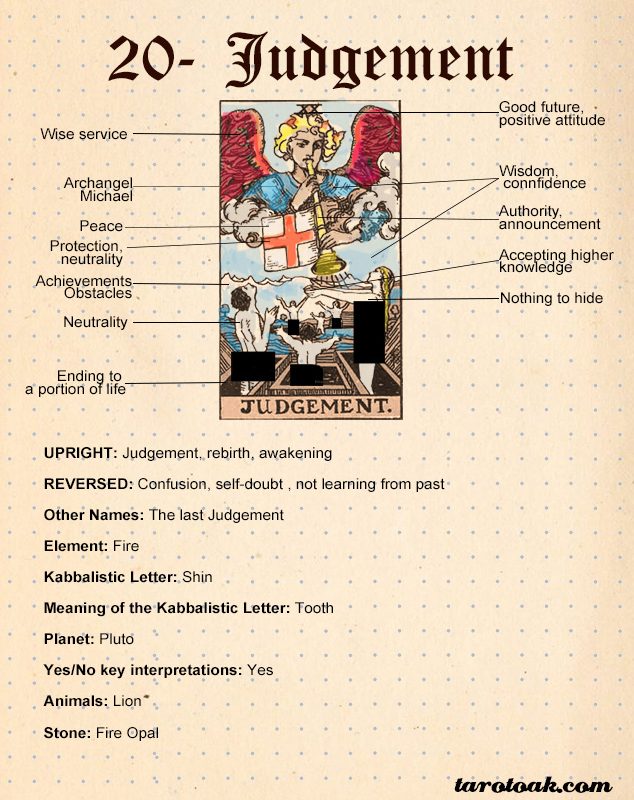The Judgment tarot card stands as one of the most evocative symbols within the tarot deck, representing a profound moment of reckoning and self-reflection. Its imagery often depicts an angelic figure blowing a trumpet, awakening the dead from their graves. This vivid tableau invites introspection, urging individuals to confront their past actions, choices, and their consequences. But what does this card truly signify, and how might it impact your journey? Let us delve into its intricate meanings and implications.
At its core, the Judgment card embodies renewal and the dawning of a new epoch. It signifies a critical juncture where individuals are prompted to reassess their paths, often leading to significant transformation. This card is not merely about judgement in a moral sense but rather signifies a call to higher consciousness and the reclamation of one’s own narrative. The act of awakening signifies casting aside ignorance and embracing the truths that lie dormant within.
The aesthetic of the card plays a crucial role in understanding its overarching theme. The resurrection imagery suggests an awakening from ignorance and a realization that change is not just possible but necessary. It hints at the potential for rebirth, metamorphosis, and new beginnings. This leads us to consider the importance of acknowledging one’s past mistakes; it implores individuals to recognize their integral role in shaping their destinies.
When the Judgment card appears in a reading, it often heralds a time of accountability. It represents a moment in which one must face the consequences of their choices. However, despite the inherent challengers of this process, it also offers an optimistic perspective. Much like the mythical phoenix, the Judgment card signifies the possibility of rising from the ashes of one’s former self. It encourages individuals to liberate themselves from guilt and regret, prompting a fresh outlook on life.
Beyond the notion of personal transformation, Judgment also holds a mirror up to our relationships with others. It beckons individuals to assess their connections, encourage open communication, and seek reconciliation with faulty dynamics. Often, this card appears when one must forgive others or, perhaps more crucially, themselves. The journey towards forgiveness is depicted as an essential step toward authentic personal growth and liberation.
Moreover, the atmosphere surrounding the Judgment card resonates with the idea of spiritual awakening. It urges practitioners to embrace their spirituality and explore their inner worlds. This card serves as a beacon of light for those who may have strayed from their path, inviting them to engage with their higher selves and make intentional decisions moving forward. Through this process, individuals are invited to harmonize their physical existence with their spiritual aspirations.
Numerologically, Judgment is linked with the number 20, symbolizing the potential of collective experiences and human growth. This duality emphasizes that transformations do not occur in isolation. Instead, they are often influenced by communal or relational frameworks. Each choice made reverberates through the fabric of existence, showcasing the interconnectedness of life. This notion serves to deepen our understanding of morality and ethics in the grand tapestry of human experiences.
In a more practical sense, individuals seeking guidance from the Judgment card may find it serves as a prompt to take decisive action. When confronted with uncertainty or indecision, the card encourages a person to reflect on their values, goals, and aspirations. It emphasizes the importance of aligning choices with one’s authentic self. The symbolism of the trumpet sounds a clarion call for radical reinterpretation; it demands individuals to stand firm in their decisions, advocating for a life imbued with purpose and integrity.
As you navigate your personal labyrinths of choice, it is crucial to understand the concept of forgiveness integral to the Judgment card. Thus, recognizing that everyone, including oneself, is fallible leads to a more compassionate human experience. It advocates for the release of burdens that weigh heavily on the spirit, freeing individuals to pursue their aspirations without the shackles of remorse or self-criticism. The promise of liberation serves as a reminder that embracing authenticity is essential for spiritual and emotional growth.
Lastly, the emergence of the Judgment card often occurs at pivotal moments in life. This could be during significant transitions such as career changes, relationships, or existential questioning. Whenever it appears, it conveys the essential message that change is not merely inevitable but a catalyst for growth. The card implores you to examine what needs to be shed, fostering emotional decluttering to allow for fresh experiences and enlightenment. Acknowledging this transformative power is imperative as one embarks on their journey of self-discovery.
In conclusion, the Judgment tarot card is a rich and multidimensional symbol, encapsulating the essence of renewal, accountability, and spiritual awakening. It serves as both a warning and an invitation, guiding you to reflect on your past and encouraging you to embrace the potential for rebirth. Embracing the call of the Judgment card can lead to profound changes in one’s perspective and ultimately unlock the door to a life filled with purpose and enlightenment. Open your heart and mind; the call for transformation awaits.







Leave a Comment